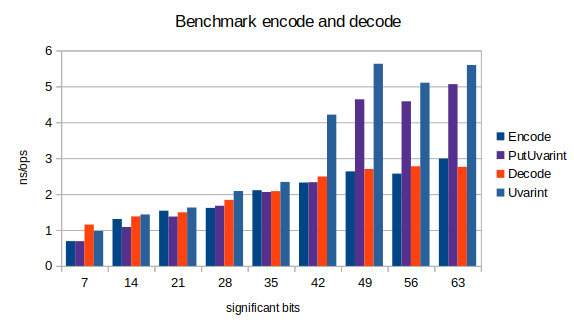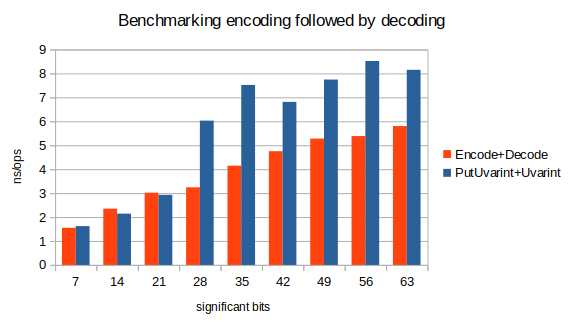Small unsigned integer values are more frequent than big values. A substantial compression may then be achieved by dropping the insignificant 0 bits when serializing integers in a byte sequence. The byte length of the encoded integer will then vary according to the number of significant bits.
The length of the encoded integer must be encoded with the integer bits so
that the original integer can be restored. There exist different ways to
encode a varying length integer. Here we consider only the encoding of uint64
values.
The most popular of such encoding is
LEB128. It allows to encode integers of
any byte size. It is the encoding used in UTF8 characters and in the
encoding/binary package for Uvarint. The maximum byte length of an uint64
encoded in LEB128 is 10 bytes.
This package implements the
prefix code. The significant bytes
are serialized in big endian order, and the most significant bits of the first
byte set to 1 encode the number of bytes that follow the first byte. This
encoding requires less bit fiddling than the postfiy code to encode or decode.
The maximum byte length of an uint64 prefix encoded is 9 bytes.
An alternate encoding is the postfix code. In this encoding the significant bytes are serialized in little endian order. The byte length is encoded as a number of 0 bits in the last byte which appears first in the encoded byte sequence. It may seam more performant than the prefix code since words may be written in memory in one instruction on little endian computers, but the bit fiddling adds a non nigligible overhead. Benchmarks comparing prefix en postfix code show indeed that prefix code is more performant when coded in Go.
There exist other encoding as the one use by SQLight, but we don't discuss them here.
To use this package you must first make sure that you have a go.mod file in
your project. To create a go.mod file, you must issue the following command in
your terminal where you replace myProgram with the name of your program.
$ go mod init myProgramThe second step is to import this package in the go source files that will use its functions.
import "github.com/chmike/varint"To encode a uint64 value, use the following function. It will serialize the
value in the byte slice and return the number of bytes written. If the slice
is too small to hold the encoded integer, the function returns 0. The
function never panics.
func varint.Encode([]byte, uint64) intIn your program, you would encode the value 1234 in the byte slice b
like this:
l := varint.Encode(b, 1234)
if l == 0 {
// b is too small to hold the encoded value
}
b = b[l:]To decode an encoded uint64 value, use the following function. It will deserialize
the value and return the number of bytes read. If the slice is too small to contain
a value (slice empty or value truncated), the function returns the value 0 and 0 bytes
read. The function never panics.
func varint.Decode([]byte) (uint64,int)In your program, you would decode an encoded value in the byte slice b like this:
l, v := varint.Decod(b)
if l == 0 {
// b is empty or the value is truncated
}
b = b[l:]These functions have the same API as the binary.PutUvarint() and the binary.Uvarint
functions and can conveniently replace them. There are a number of differences though.
- the
Uvarint()andPatUvarintfunctions may panic - the function
PutUvarint()will never return 0 Uvarint()may return a negative number of bytes read in some conditions.
The extensive study of performance comparing different implementation of
postfix and prefix encoding led to this code. Its performance is compared
with the binary.PutUvarint() and binary.Uvarint() and presented in
the following graphic. The data is made available in docs/data.txt.
The LEB128 encoding with binary.PutUvarint() for values up to 35 bits
is as fast as varint.Encode() function. Encoding values smaller than
128 is inlined. varint.Decode() of such values is slower than Uvarint
because it is not inlined by the compiler.
For unknown reason the LEB128 encoding and decoding functions become significantly slower for values bigger than 35bits on my computer. I don't know if it's due to the compiler or the CPU.
The following graphic shows the time required to encode and decode a
uint64 value. This clearly shows that varint is faster. Since a value
is usually written once and read many times, it shows that prefix encoding
is a more efficient encoding than LEB128.
The benchmark is advantaging the chmike/varint code due to branch prediction
optimisation. Encoding a slice of uint64 values of different magnitude would
mitigate this effect. A zipf distributed magnitude might be more realist.
Any other suggestion for a better benchmarking method is welcome in the issue section.

